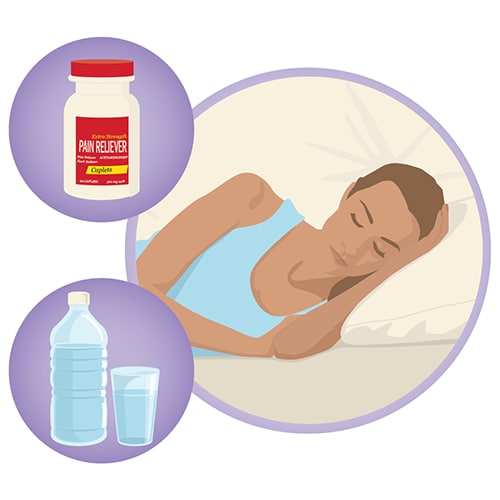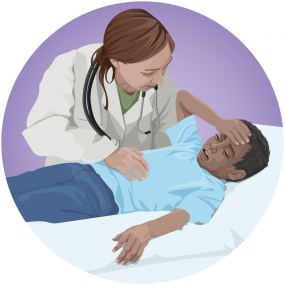what to do if you have dengue fever
Most people who get dengue won't have symptoms. But for those that do, the most common symptoms are high fever, headache, body aches, nausea and rash. Most will also get better in 1–2 weeks. Some people develop severe dengue and need care in a hospital
Dengue (break-bone fever) is a viral infection that spreads from mosquitoes to people. It is more common in tropical and subtropical climates.
Most people who get dengue won’t have symptoms. But for those that do, the most common symptoms are high fever, headache, body aches, nausea and rash. Most will also get better in 1–2 weeks. Some people develop severe dengue and need care in a hospital.
In severe cases, dengue can be fatal.
You can lower your risk of dengue by avoiding mosquito bites, especially during the day.
Dengue is treated with pain medicine as there is no specific treatment currently.
Symptoms
Most people with dengue have mild or no symptoms and will get better in 1–2 weeks. Rarely, dengue can be severe and lead to death.If symptoms occur, they usually begin 4–10 days after infection and last for 2–7 days. Symptoms may include:high fever (40°C/104°F)
severe headache
pain behind the eyes
muscle and joint pains
nausea
vomiting
swollen glands
rash.
Individuals who are infected for the second time are at greater risk of severe dengue.
Severe dengue symptoms often come after the fever has gone away: severe abdominal pain
persistent vomiting
rapid breathing
bleeding gums or nose
fatigue
restlessness
blood in vomit or stool
being very thirsty
pale and cold skin
feeling weak.
People with these severe symptoms should get care right away.
After recovery, people who have had dengue may feel tired for several weeks
Diagnostics and treatment
Most cases of dengue fever can be treated at home with pain medicine. Preventing mosquito bites is the best way to avoid getting dengue.There is no specific treatment for dengue. The focus is on treating pain symptoms
Acetaminophen (paracetamol) is often used to control pain. Non-steroidal anti-inflammatory drugs like ibuprofen and aspirin are avoided as they can increase the risk of bleeding.
There is a vaccine called Dengvaxia for people who have had dengue at least once and live in places where the disease is common.
For people with severe dengue, hospitalization is often needed.
Global burden
The incidence of dengue has grown dramatically around the world in recent decades, with cases reported to WHO increased from 505 430 cases in 2000 to 5.2 million in 2019. A vast majority of cases are asymptomatic or mild and self-managed, and hence the actual numbers of dengue cases are under-reported. Many cases are also misdiagnosed as other febrile illnesses (1).One modelling estimate indicates 390 million dengue virus infections per year of which 96 million manifest clinically (2). Another study on the prevalence of dengue estimates that 3.9 billion people are at risk of infection with dengue viruses.
The disease is now endemic in more than 100 countries in the WHO Regions of Africa, the Americas, the Eastern Mediterranean, South-East Asia and the Western Pacific. The Americas, South-East Asia and Western Pacific regions are the most seriously affected, with Asia representing around 70% of the global disease burden.
Dengue is spreading to new areas including Europe, and explosive outbreaks are occurring. Local transmission was reported for the first time in France and Croatia in 2010 and imported cases were detected in 3 other European countries.
The largest number of dengue cases ever reported globally was in 2019. All regions were affected, and dengue transmission was recorded in Afghanistan for the first time. The American Region reported 3.1 million cases, with more than 25 000 classified as severe. A high number of cases were reported in Bangladesh (101 000), Malaysia (131 000) Philippines (420 000), Vietnam (320 000) in Asia.
Dengue continues to affect Brazil, Colombia, the Cook Islands, Fiji, India, Kenya, Paraguay, Peru, the Philippines, the Reunion Islands and Vietnam as of 2021.
Risk factors
Previous infection with DENV increases the risk of the individual developing severe dengue.Urbanization (especially unplanned), is associated with dengue transmission through multiple social and environmental factors: population density, human mobility, access to reliable water sources, water storage practices, etc.
The community’s risks to dengue also depend on the population’s knowledge, attitude, and practice towards dengue, as well as the implementation of routine sustainable vector control activities in the community.
Consequently, disease risks may change and shift with climate change in tropical and subtropical areas, and vectors might adapt to new environments and climates.
Prevention and Control
The mosquitoes that spread dengue are active during the day.
Lower the risk of getting dengue by protecting yourself from mosquito bites by using: clothes that cover as much of your body as possible
mosquito nets if sleeping during the day, ideally nets sprayed with insect repellent
window screens
mosquito repellents (containing DEET, Picaridin or IR3535)
coils and vaporizers.
If you get dengue, it’s important to:rest
drink plenty of liquids
use acetaminophen (paracetamol) for pain
avoid non-steroidal anti-inflammatory drugs, like ibuprofen and aspirin
watch for severe symptoms and contact your doctor as soon as possible if you notice any.
So far one vaccine (Dengvaxia) has been approved and licensed in some countries. However, only persons with evidence of past dengue infection can be protected by this vaccine. Several additional dengue vaccine candidates are under evaluation.
References
1. Bhatt, S., et al., The global distribution and burden of dengue. Nature, 2013. 496(7446): p. 504–507.
2. Brady, O.J., et al., Refining the global spatial limits of dengue virus transmission by evidence-based consensus. PLOS Neglected Tropical Diseases, 2012. 6(8): p. e1760
Caring for a Child or Family Member Sick with Dengue
Treat Mild Symptoms at Home

- Rest as much as possible
- Control fever
- Give acetaminophen (also known as paracetamol) to control fever and relieve pain. Always follow product label instructions. Do not give ibuprofen, aspirin, or aspirin-containing drugs.
- Sponge the person’s skin with cool water to reduce fever.
- Prevent dehydration – Dehydration occurs when a person loses too much body fluid from fever, vomiting, or not drinking enough liquids
Signs of mild to moderate dehydration
| Babies and Children | Adults |
|---|---|
| Urinates less frequently (less than 6 wet diapers per day) | Thirst, dry or sticky mouth dry |
| y mouth, tongue, lips | Not peeing very much, dark yellow pee |
| Few or no tears when crying | Dry, cool skin |
| Sunken soft spot of the head | Headache |
| What to do: Talk to your healthcare provider. Provide fluids such as water, juice, milk, or drinks with added electrolytes. | |
Signs of severe dehydration
| Babies and Children | Adults |
|---|---|
| Sleepiness, lack of energy, very fussy | Not peeing very much, dark yellow pee |
| Sunken eyes | Feeling dizzy, sleepy, no energy, confused, or irritable |
| Cool, discolored hands or feet | Rapid heart rate, breathing |
| Urinates 1-2 times per day | Sunken eyes |
What to do: Go to an urgent care clinic or the emergency room immediately.As Fever Goes AwayWatch for warning signsAlthough the fever has gone away, the next phase of dengue can be dangerous for some people. Warning signs generally begin in the 24-48 hours after the fever has gone away. About 1 in 20 people with dengue will develop severe dengue. Severe dengue requires hospitalization and can be life threatening.  If you or a family member develop any of the following warning signs, go to an urgent care clinic or the emergency room immediately:
Severe dengue is a medical emergency and requires immediate medical attention or hospitalization. If You Have Dengue, Protect OthersDuring the first week of infection, dengue virus is found in the blood of an infected person. If a mosquito bites an infected person, the mosquito becomes infected. The infected mosquito can spread the virus to other people through bites. Avoid mosquito bites indoors to keep family from getting dengue.
Use Environmental Protection Agency (EPA)-registered insect repellents with one of the active ingredients below. Higher percentages of active ingredient provide longer protection. When used as directed, EPA-registered insect repellents are proven safe and effective, even for pregnant and breastfeeding women.
Find the right insect repellent for you by using EPA’s search tool. | |

